WHO now backs masks as coronavirus precaution: Live updates
Health agency says anecdotal evidence of the benefits of wearing masks in crowds has prompted it to change position.
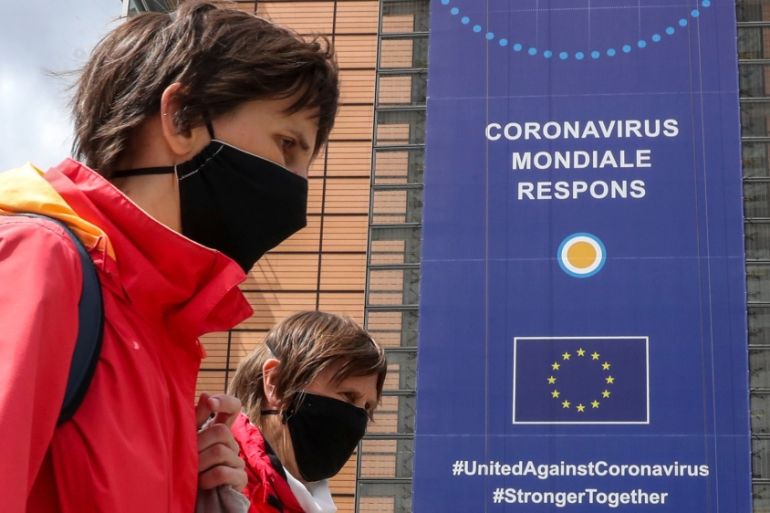
-
The World Health Organization (WHO) on Friday changed its position on masks, now encouraging people to wear them in crowded places, citing anecdotal evidence that supports their value in stopping the spread of the coronavirus.
-
US President Donald Trump called for a shift in strategy against the coronavirus pandemic to focus resources on protecting “high-risk populations” while calling for a total end to stay-at-home orders in states throughout the country.
-
India’s COVID-19 deaths passed 6,000 after it registered 260 deaths in the last 24 hours. The country registered 9,304 new cases in yet another record single-day spike in infections, raising its totals to 216,919 cases with 6,075 deaths, the health ministry reported on Thursday.
-
The coronavirus death toll in Brazil soared to a new daily record, with 1,473 deaths logged at the end of Thursday. With more than 34,000 deaths, Brazil now has the third-highest toll in the world.
-
About 6.6 million coronavirus cases have been confirmed around the world, according to data from Johns Hopkins University. More than 389,000 people have died, including some 108,000 in the United States. More than 2.8 million people have recovered.
Here are the latest updates:
June 5, Friday
19:50 GMT – White House forces reporters to ditch social distancing
The White House abandoned social distancing for reporters attending President Donald Trump’s Rose Garden event Friday because “it looks better,” according to the aide who ordered it.
Keep reading
list of 4 itemsMexico’s teachers seek relief from pandemic-era spike in school robberies
‘A bad chapter’: Tracing the origins of Ecuador’s rise in gang violence
Why is the US economy so resilient?
Seats for reporters at recent White House events had been placed 6 feet apart to protect against the spread of the coronavirus. But shortly before Friday’s event, Trump aides moved the seats closer together so reporters were sitting shoulder-to-shoulder.
The decision “needlessly put reporters’ health at risk,” said Jonathan Karl of ABC News, president of the White House Correspondents’ Association.
White House spokesman Judd Deere said it was his decision to move the seats closer together, saying “It looks better” and “I would remind you that those in the (press) pool are tested, everyone is temperature-checked and asked if they have had symptoms.”
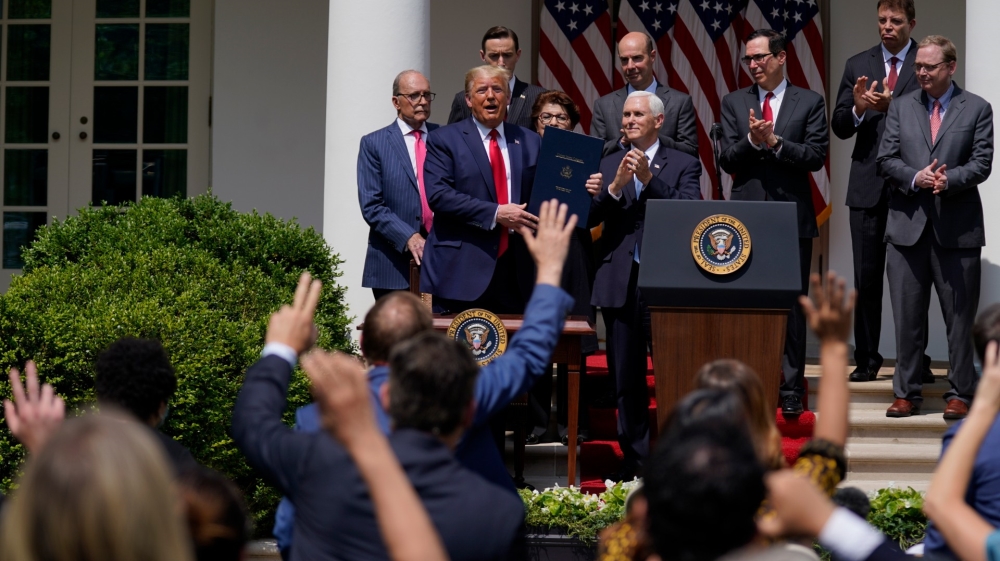
19:30 GMT – New website shows impact of European restrictions
Environmental and economic impacts of the coronavirus in Europe can now be seen using satellite data provided by the European Space Agency, it has announced.
The ESA and the European Commission launched an internet-based programme that compares pollution levels during the health crisis with a baseline scenario, measures chlorophyll concentrations, and illustrates economic indicators such as harvests.
19:10 GMT – Jordan reopens mosques for socially distanced prayers
Mosques in Jordan have opened for communal prayers for the first time in over two months, with thousands of police deployed to enforce strict social distancing rules at the usually packed places of worship.
The kingdom is gradually easing restrictions imposed to curb the coronavirus outbreak, which killed nine people in Jordan. From Saturday, cafes and hotels can reopen and domestic flights will resume, although schools, universities and cinemas remain closed and most public gatherings are still banned.
Over 30,000 police were deployed to oversee crowds attending prayers at the country’s 7,000 mosques on Friday, officials said.
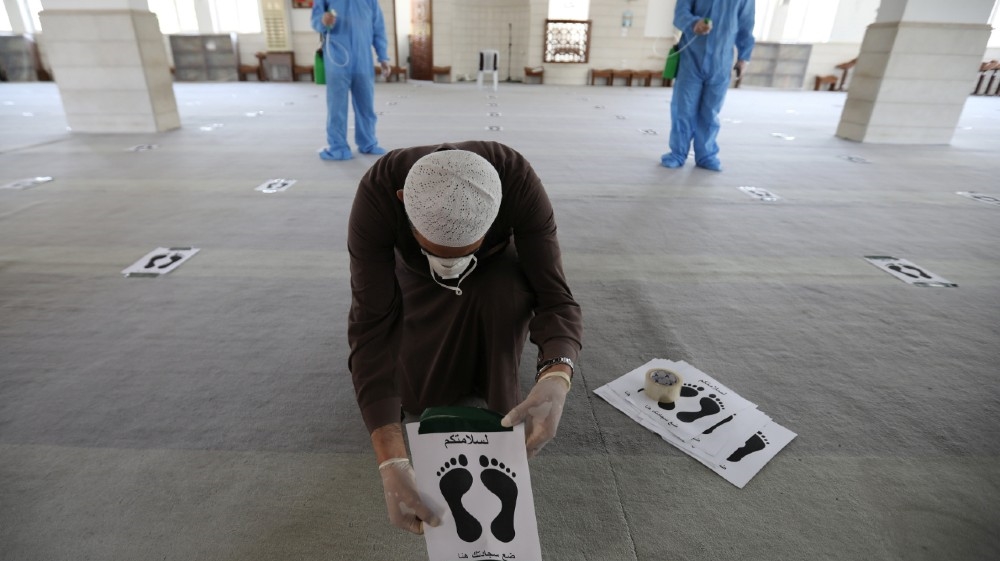
18:40 GMT – Americans misuse disinfectants in ‘high risk’ practice to prevent infection: US survey
More than a third of Americans misused cleaners and disinfectants to try to prevent infection by the coronavirus, according to a US survey taken shortly after President Donald Trump publicly asked whether injecting such products could treat COVID-19.
Washing food with bleach, using household cleaning or disinfectant products on bare skin, and intentionally inhaling or ingesting these products were some of the most commonly reported “high-risk” practices in a May 4 online survey of 502 US adults, the US Centers for Disease Control and Prevention (CDC) reported.
The survey’s lead author said it was undertaken following a “sharp increase” in calls to poison control centers.
|
|
18:10 GMT – China warns against travel to Australia, citing discrimination
China’s Ministry of Culture and Tourism has advised the public to avoid traveling to Australia, citing racial discrimination and violence against the Chinese in connection with the COVID-19 pandemic.
“There has been an alarming increase recently in acts of racial discrimination and violence against Chinese and Asians in Australia, due to the impact of the COVID-19 pandemic,” the ministry said in a statement. It did not give any specific examples of such discrimination or violence.
Asians of various backgrounds have said they have been harassed since the outbreak of the novel coronavirus, including in the United States. China issued a warning to tourists traveling there earlier this year after some said they were mistreated in connection with the outbreak.
17:50 GMT – Saudi reimposes virus lockdown on Jeddah
Saudi Arabia has announced a renewed lockdown in the city of Jeddah, gateway to the annual Muslim pilgrimage to Mecca, to counter a new spike in coronavirus cases.
“After reviewing the epidemiological situation and the high occupancy rates of intensive care departments, it was decided to take strict health precautions in the city of Jeddah for two weeks,” starting from Saturday, the health ministry said.
The measures include a curfew running from 3 pm to 6 am, a suspension of prayers in mosques and a stay-at-home order for public and private sector workers in the Red Sea city whose airport serves Mecca pilgrims.
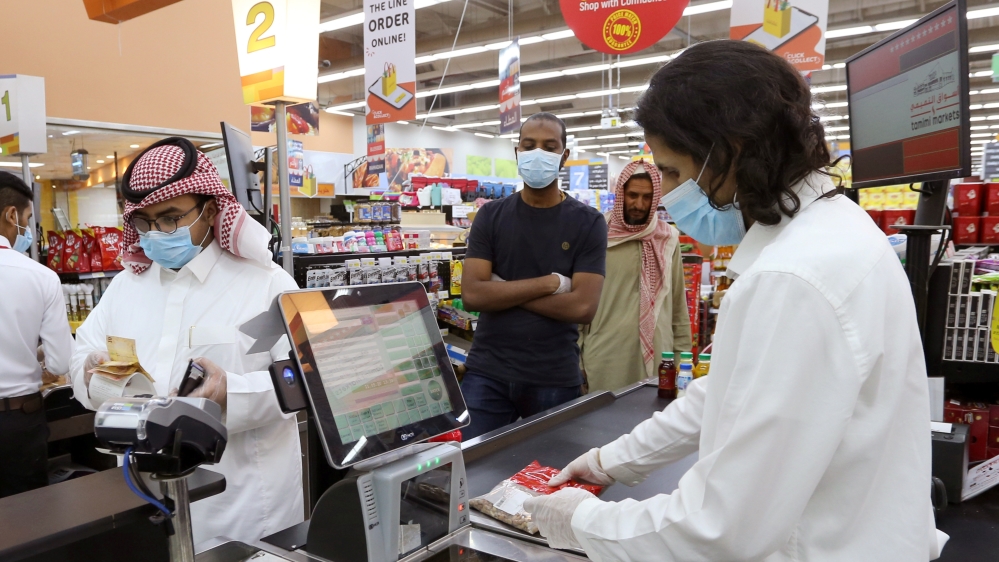
17:30 GMT – UK death toll cases tops 40,000
The United Kingdom’s death toll from confirmed cases of COVID-19 has exceeded 40,000, according to government data.
In all, 40,261 people had died following positive tests for coronavirus as of 1600 GMT on Thursday, the health ministry said, up 357 from the previous day.
Including suspected cases, the United Kingdom’s death toll this week surpassed 50,000, according to a Reuters news agency tally of official data sources.
17:10 GMT – France reports 46 more deaths, total at 29,111
France’s coronavirus death toll has risen by 46, or 0.2 percent, to reach 29,111, which is the fifth-highest total in the world.
The rate of increase is the same as Thursday, while the number of people hospitalised for COVID-19 disease continued its long-running decline, the health ministry said in a statement.
16:50 GMT – Kenyan police killed 15 since start of curfew: Oversight body
The Kenyan police have been involved in the killing of 15 people since the country put a dusk-to-dawn curfew in place in March to combat the coronavirus, the policing oversight body said in a statement seen by AFP news agency. At least 31 people have been injured.
“The authority has received 87 complaints against police officers since March 27, 2020, when heightened security measures were put in place,” the Independent Policing Oversight Authority (IPOA) said.
“After preliminary investigations, 15 deaths and 31 incidents where victims sustained injuries have directly been linked to actions of police officers during the curfew enforcement.”
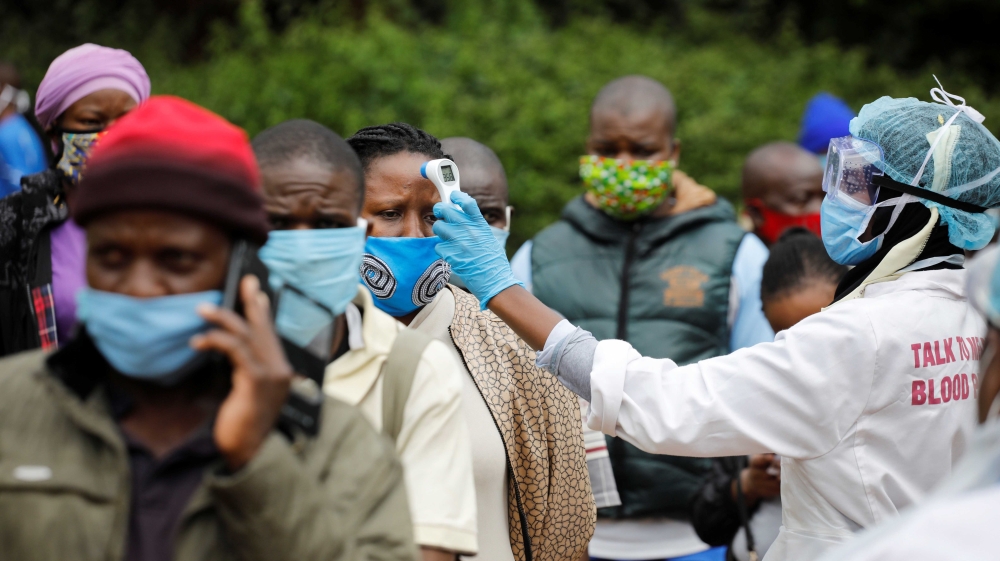
16:30 GMT – Epidemics in India, S Asia growing but not exploding: WHO
The number of COVID-19 cases in India has been doubling every three weeks but the epidemic is not growing exponentially in the country and South Asia region, according to the WHO.
“In South Asia, not just in India, but in Bangladesh and … Pakistan and other countries of South Asia with large dense populations, the disease has not exploded, but there is always the risk of that happening,” Mike Ryan, WHO’s top emergency expert, told a news conference.
Soumya Swaminathan, WHO’s chief scientist, noting India has a population of 1.3 billion, said the 200,000 reported cases “look big but for a country of this size it’s still modest”.
|
|
16:10 GMT – Italy records 85 new deaths, 518 new cases
Deaths from COVID-19 in Italy have climbed by 85 against 88 the day before, the Civil Protection Agency said, while the daily tally of new cases jumped to 518 from 177 on Thursday.
The total death toll since the outbreak came to light on February 21 now stands at 33,774, the agency said, the fourth-highest in the world after those of the US, Britain and Brazil.
The number of confirmed cases amounts to 234,531, the sixth-highest global tally behind those of the US, Russia, Spain, Britain and Brazil.
15:50 GMT – UK gov’t urges people not to attend large protests
UK Health Minister Matt Hancock has urged people not to attend large anti-racism demonstrations because of the risk of the coronavirus.
Tens of thousands marched through central London on Wednesday to protest against racism after the death of George Floyd, an unarmed Black man, in the US city of Minneapolis, and further demonstrations are planned over the weekend.
“I understand why people are deeply upset but we are still facing a health crisis and coronavirus remains a real threat,” Hancock said at the government’s daily news conference. “So please, for the safety of your loved ones, do not attend large gatherings, including demonstrations of more than six people.”
|
|
15:20 GMT – UK halts trial of ‘useless’ hydroxychloroquine
British scientists have halted a large trial that had been exploring the use of the anti-malarial drug hydroxychloroquine in patients with COVID-19 after initial results showed no evidence of benefit.
“We reviewed the data and concluded there is no evidence of a beneficial effect of hydroxychloroquine in patients hospitalised with COVID, and decided to stop enrolling patients to the hydroxychloroquine arm with immediate effect,” said Martin Landray, an Oxford University professor who is co-leading the so-called RECOVERY trial.
“This is not a treatment for COVID-19. It doesn’t work,” he said. “This result should change medical practice worldwide … We can now stop using a drug that is useless.”
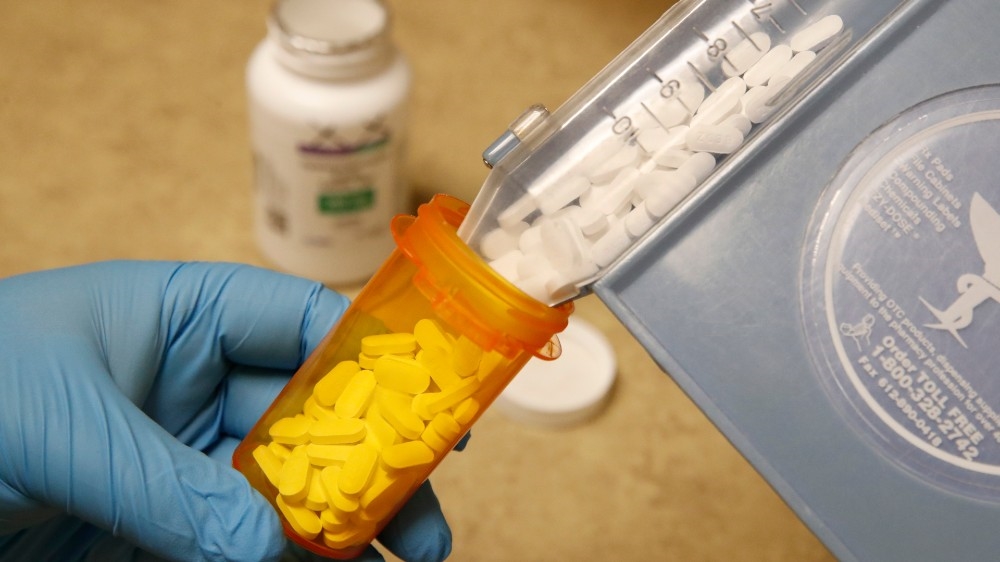
15:50 GMT – WHO encourages masks where virus widespread, distancing tough
The WHO has updated guidance on wearing masks during the COVID-19 pandemic, encouraging their use in crowded situations in places where the new coronavirus is widespread.
“Governments should encourage the general public to wear masks where there is widespread transmission and physical distancing is difficult, such as on public transport, in shops or in other confined or crowded environments,” WHO chief Tedros Adhanom Ghebreyesus said.
The agency said the widespread use of face masks or coverings by the general public is still not supported by high-quality or direct scientific evidence, but a growing amount of observational evidence from several countries is enough for it to change its advice.
15:30 GMT – Trump calls for strategy shift to allow for end to lockdowns
Trump has called for a shift in strategy against the coronavirus pandemic to focus resources on protecting “high-risk populations” as he pushes for a total end to stay-at-home orders in states throughout the US.
“The best strategy to ensure the health of our people moving forward is to focus our resources on protecting high-risk populations, like the elderly and those in nursing homes, while allowing younger and healthy Americans to get back to work immediately,” Trump said in remarks at the White House Rose Garden.
He added: “I don’t know why” some jurisdictions “continue to lock down”.
More than 108,000 Americans have died and nearly 1.8 million have been infected in the US with the coronavirus.
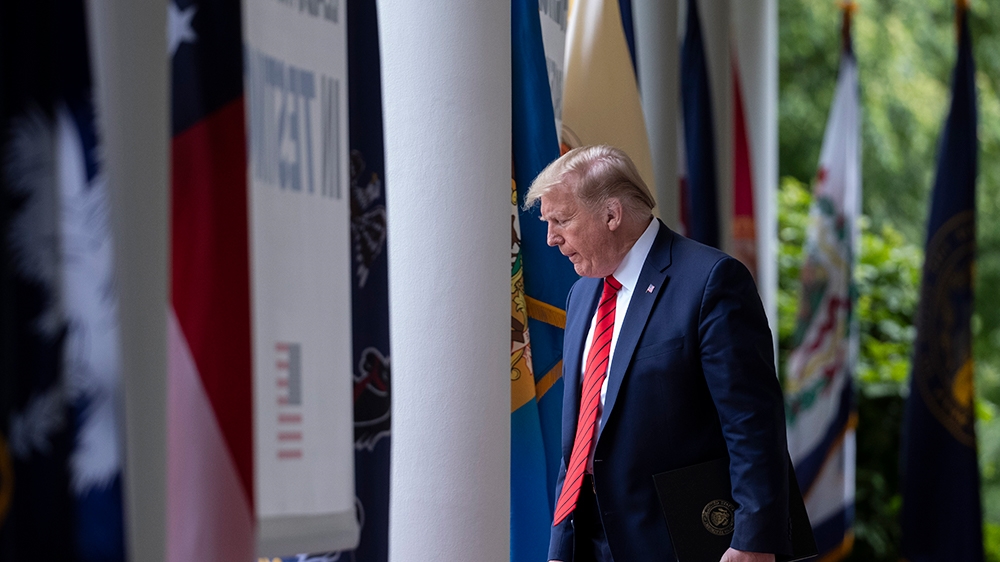
15:10 GMT – Bolsonaro ‘failed’ in pandemic response, says Greta Thunberg
Brazilian President Jair Bolsonaro has failed in managing the coronavirus crisis, teenage climate activist Greta Thunberg has said, a day after a record rise in deaths in the South American nation.
“The Bolsonaro government has definitely failed in tackling the coronavirus pandemic as many other governments have also done,” the 17-year-old Swede said in a video conference with journalists.
Brazil’s presidency declined to comment. Bolsonaro has fiercely criticised measures to shut down non-essential businesses and keep residents indoors to slow the spread of the novel coronavirus, saying the economic damage being done is worse than the health risk itself.
14:45 GMT – Iraq records more than 1,000 new cases for first time
Iraq has recorded more than 1,000 new coronavirus cases in a single day for the first time, with its total approaching 10,000 confirmed cases, the health ministry said.
At least 285 people have died of COVID-19 in Iraq, it said.
It recorded 1,006 new cases, out of a total of 9,846 overall. The cases have tripled in the space of about three weeks.
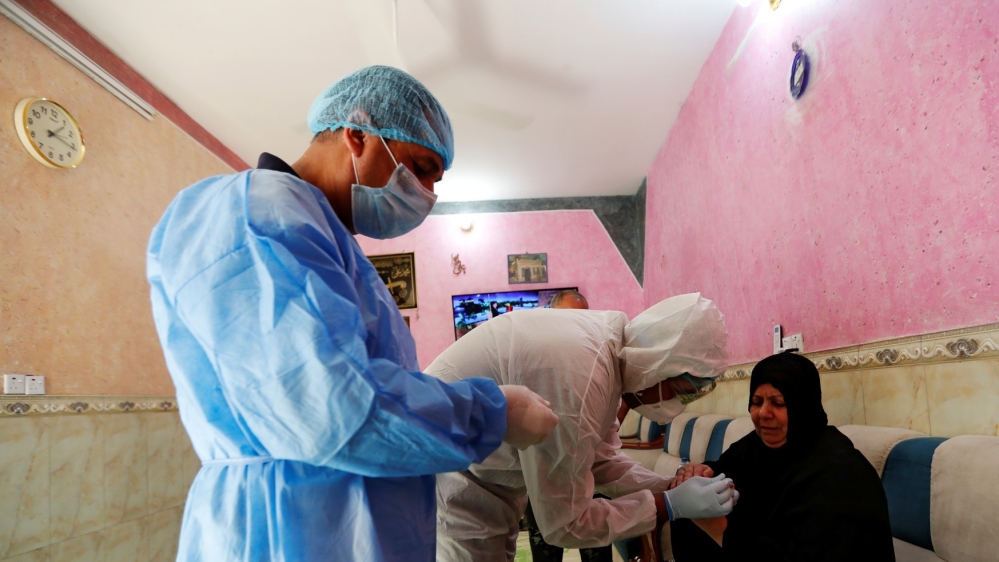
14:20 GMT – Rare turtle lays eggs on tourist-free Thai beach
A critically endangered turtle emerged from the sea to lay at least 80 eggs on a Thai beach just minutes before the start of World Environment Day – just one sign of how wildlife is making the most of the coronavirus pandemic limiting human movement.
The hawksbill sea turtle chose a beach on Koh Samui, an island typically visited by several million people each year, and was tracked by veterinarians thanks to an implanted digital chip.
National park and wildlife conservation staff were on the spot to collect a blood sample and check the health of the turtle, which they estimated to be about 30 years old.
The hawksbill turtles’ number has reduced significantly because of the trade in their shells, which is now illegal.
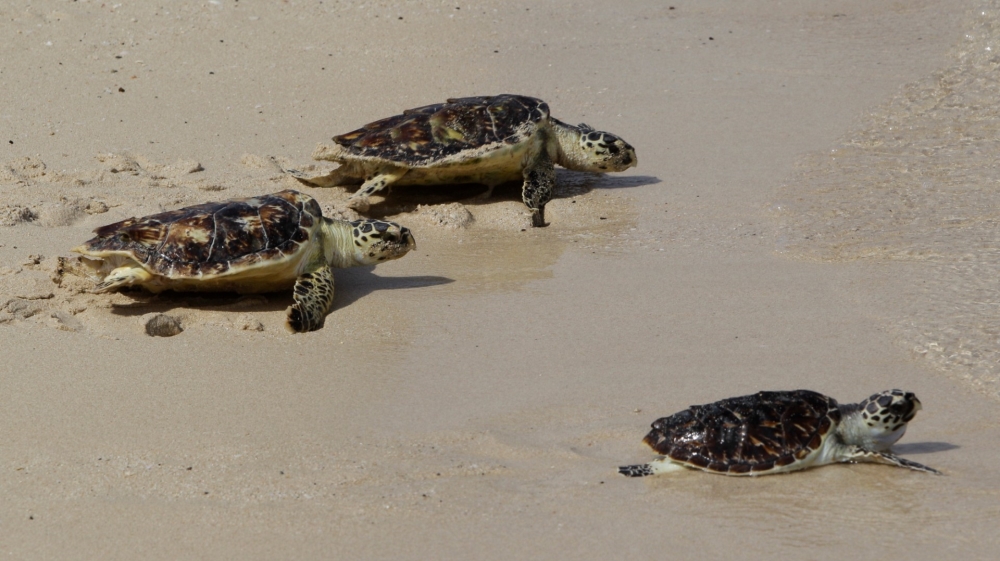
13:40 GMT – S Africa cases rise, president worries about Cape Town region
Even as South Africa eases its coronavirus lockdown, infection numbers have started to rise quickly and President Cyril Ramaphosa has said he is particularly concerned about the province around Cape Town.
Western Cape, whose Table Mountain and wine tours make it a leading tourist destination, has become the country’s main coronavirus hotspot, with about two-thirds of the country’s total 40,792 cases. It has also recorded 651 out of the country’s total of 848 deaths.
South Africa recorded its largest daily jump of cases on Thursday, with 3,267 new cases.
13:00 GMT – Ireland to accelerate lockdown easing plan: PM
Ireland will accelerate its plan to ease coronavirus lockdown restrictions in the coming days, Prime Minister Leo Varadkar has said.
“Today I can confirm that it is safe to move to phase two of the plan to reopen our country starting on Monday,” Varadkar said. “I’m also announcing an acceleration of the road map.”
In line with the government plan to reopen the republic, more workplaces and shops will reopen on Monday, while a hastening of the scheme will allow widespread travel and see the final lifting of all lockdown restrictions in July rather than August.
Hi, this is Joseph Stepansky in Doha, taking over the live updates from my colleague Shereena Qazi.
11:50 GMT – Bangladeshi courts freeing child suspects due to virus risk
Authorities in Bangladesh have been releasing hundreds of children suspected of committing mostly petty crimes as they try to keep the coronavirus from spreading in overcrowded detention centres, officials have said.
The orders for their release on bail came from virtual courts set up by the country’s Supreme Court with the help of UNICEF, officials said.
About 400 children have been granted bail in recent weeks and more than 300 of them have already been reunited with their families, said Natalie McCauley, chief of child protection at UNICEF in Bangladesh.
She said the decision came as public health experts said children living in the country’s detention centres face a higher risk of getting infected, mainly because of overcrowding and poor conditions.
10:20 GMT – Jakarta mosques host Friday prayers for first time in two months
Indonesians in Jakarta returned to mosques for prayers after the city relaxed rules on attending places of worship as part of a loosening of restrictions in place since late March to contain the spread of the coronavirus.
Jakarta’s governor on Thursday announced some easing of restrictions including attending mosques for communal prayers but warned the fight against the outbreak was far from over in southeast Asia’s biggest city.
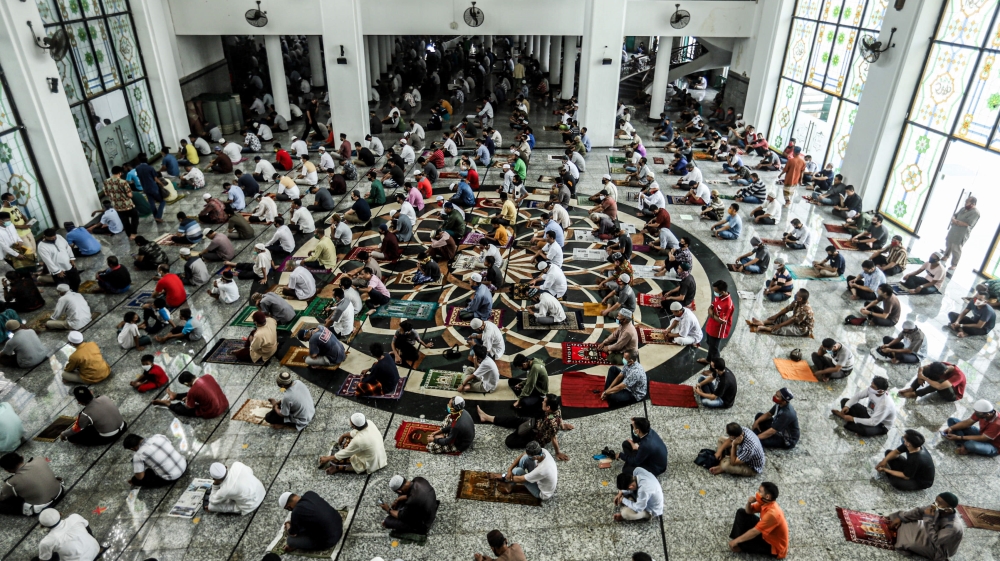
Indonesia has been the hardest-hit country in east Asia outside China from the pandemic and Jakarta has been the epicentre of the outbreak, with 7,766 cases and 523 deaths.
Some public transport has resumed operations and offices and malls are due to open in the city over the next two weeks.
10:16 GMT – ‘It’s not over until there is no virus anywhere in the world’ – WHO
Some countries have seen “upticks” in COVID-19 cases as lockdowns ease, and populations must continue to protect themselves against the coronavirus, the World Health Organization (WHO) has said.
“On upticks, yes we have seen in countries around the world – I’m not talking specifically about Europe – when the lockdowns ease, when the social distancing measures ease, people sometimes interpret this as ‘OK, it’s over’,” WHO spokeswoman Margaret Harris told a UN briefing in Geneva.
“It’s not over. It’s not over until there is no virus anywhere in the world,” she said, adding that US protesters must also take precautions when gathering.
09:45 GMT – Malaysia reports 19 new coronavirus cases, one new death
Malaysia reported 19 new confirmed coronavirus cases, taking the cumulative total to 8,266 infections.
The health ministry also reported its first death in two weeks, raising the number of fatalities to 116.
Earlier on Friday, Malaysia’s Prime Minister Muhyiddin Yassin unveiled an additional economic stimulus package worth around $8.2bn in a bid to revitalise industries badly hit by the pandemic.
09:30 GMT – Turkey’s Erdogan cancels surprise weekend curfew
Turkish President Recep Tayyip Erdogan cancelled a weekend lockdown to contain the coronavirus, announced hours earlier by the interior ministry, after a public backlash.
The two-day lockdown was to go into effect at midnight (21:00 GMT) in the 15 hardest-hit provinces and cities, including the national capital, Ankara, and financial hub Istanbul.
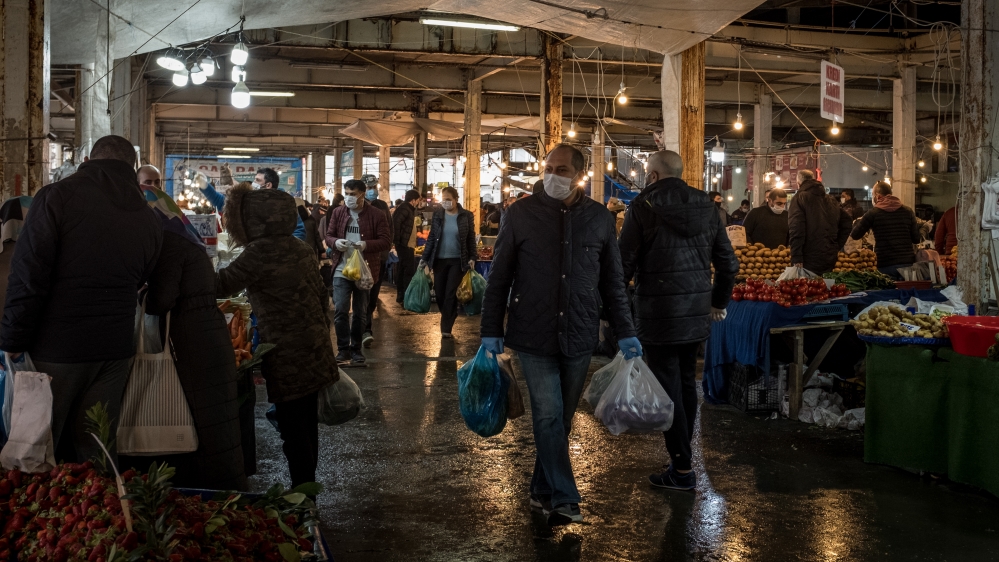
“However, the assessments we received from our citizens led us to reconsider the decision,” Erdogan tweeted in revoking the order, instead appealing to people to wear masks and maintain physical distancing rules.
The new weekend curfew – announced by the ministry late Thursday – came as a surprise as Turkey started easing restrictions this week. A travel ban on these 15 areas was lifted on Monday.
09:00 GMT – AstraZeneca ‘on track’ to roll out virus vaccine in September
British pharma giant AstraZeneca is “on track” to begin rolling out up to two billion doses of a coronavirus vaccine in September if ongoing trials prove successful, its chief executive said.
The company is partnering with Oxford University, which has pioneered the vaccine, and is already manufacturing doses before seeking final regulatory approval once testing concludes in the coming months.
“So far we’re still on track … we are starting to manufacture this vaccine right now, and we have to have it ready to be used by the time we have the results,” AstraZeneca chief executive Pascal Soriot told BBC radio.
“Our present assumption is that we will have the data by the end of the summer, by August, so in September we should know whether we have an effective vaccine or not.”
The firm announced this week it had struck agreements with the Coalition for Epidemic Preparedness Innovations (CEPI), Gavi, the Vaccine Alliance, and the Serum Institute of India to double the production capacity of the COVID-19 vaccine to two billion doses.
08:45 GMT – Philippines reports 3 new coronavirus deaths, 244 more cases
The Philippines’ health ministry Confirmed three new coronavirus deaths and 244 more infections, the lowest single-day increase in cases in two weeks.
In a bulletin, the ministry said total deaths have reached 987 while confirmed cases have risen to 20,626. There are 4,330 patients who have recovered.
07:50 GMT – Russia’s coronavirus infections near 450,000
Russia reported 8,726 new cases of the novel coronavirus on Friday, pushing the total number of infections to 449,834.
Officials said 144 people had died in the last 24 hours, bringing the official nationwide death toll to 5,528.
07:47 GMT – COVID-19 pandemic ‘under control’ in France
The COVID-19 pandemic is now “under control” in France, the head of the government’s scientific advisory council said, as the country cautiously lifts a lockdown imposed in March.
“We can reasonably say the virus is currently under control,” Jean-Francois Delfraissy told France Inter radio.
|
|
“The virus is still circulating, in certain regions in particular … but it is circulating slowly,” he added.
Delfraissy, an immunologist, and his colleagues were appointed to the coronavirus advisory panel as authorities sought to contain an outbreak that has killed more than 29,000 people in France.
The number of daily deaths has fallen, however, with just 44 reported by the health ministry on Thursday.
07:00 GMT – Czechs drop travel restrictions for Austria, Germany, Hungary
The Czech government agreed to fully open its borders with neighbours Austria and Germany and allow unrestricted travel to and from Hungary from noon on Friday, Prime Minister Andrej Babis said.
It fully opened its border with Slovakia.
“People who visit these countries do not need any coronavirus test nor quarantine,” Babis told a news conference shown live on television.
“We want to return to normal, it can also be beneficial for the Czech Republic when people from these countries come and spend money here.”
Foreign Minister Tomas Petricek said all restrictions on travel to and from Austria and Hungary had been removed, though travellers to Germany still needed to observe Germany’s current conditions for entry.
The Czechs are planning to allow unrestricted entry from more than 20 European states from June 15.
Visitors arriving from places where the epidemic is still widespread will have to provide a negative COVID-19 test or be quarantined on arrival.
06:52 GMT – Pakistan registers new cases
Pakistan has registered 3,985 new cases of the coronavirus, raising the country’s tally of cases to 89,249, as an increased rate of spread of the virus continues in the South Asian nation.
This week, the country’s case tally has risen by 19,753, or 22 percent.
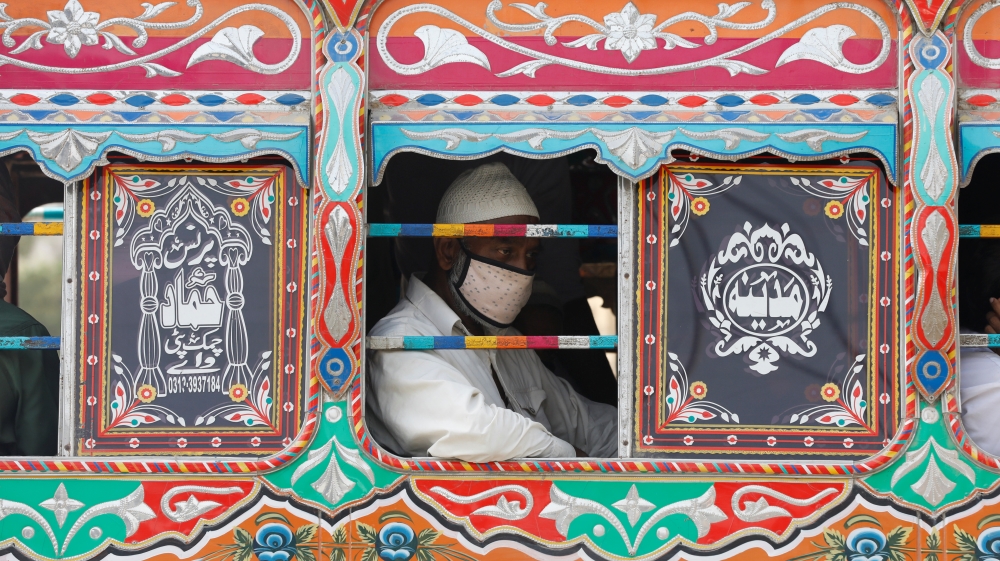
Restrictions remain largely lifted or ignored across the country. This week, Prime Minister Imran Khan called for citizens to resume visiting tourist locations.
At least 73 people died from COVID-19 on Thursday, raising the country’s overall death toll from the coronavirus to 1,886. Pakistan, like other South Asian countries, has seen a lower rate of deaths among confirmed cases of the coronavirus than in many European and North American countries, registering a case fatality rate of 2.11 percent, compared to 14.13 in the UK, 15.33 in France and 5.79 percent in the United States.
05:56 GMT – Malaysia urged to end migrant raids after ‘alarming’ outbreak at detention centres
A prominent human rights group called on Malaysia’s government to end operations against undocumented migrants after health authorities reported 270 coronavirus cases at the Bukit Jalil immigration detention depot.
“Fears about immigration detention centres turning into hotbeds for the spread of COVID-19 have now materialised, with the highest number of COVID-19 cases ever recorded on a single day,” said Preethi Bhardwaj, interim executive-director of Amnesty International Malaysia.
“Many lives are at risk,” she said, calling for an end to the rounding up of migrants as well as action to ease overcrowding at the detention centres.
“Priority must be given to finding alternative accommodation that is suitable and where detainees can socially distance,” she said, adding: “There is a need to address the cramped cells in these detention centres, which will only encourage further spread of the disease.”
05:42 GMT – India logs another record single-day spike
India registered more than 9,800 new cases of the coronavirus in another biggest single-day spike.
The health ministry said the total number of confirmed cases touched 226,770 with 6,348 deaths, 273 of them in the past 24 hours. The overall rate of recovery is around 48 percent.
Infections have surged in rural areas following the return of hundreds of thousands of migrant workers who left cities after the lockdown in late March.
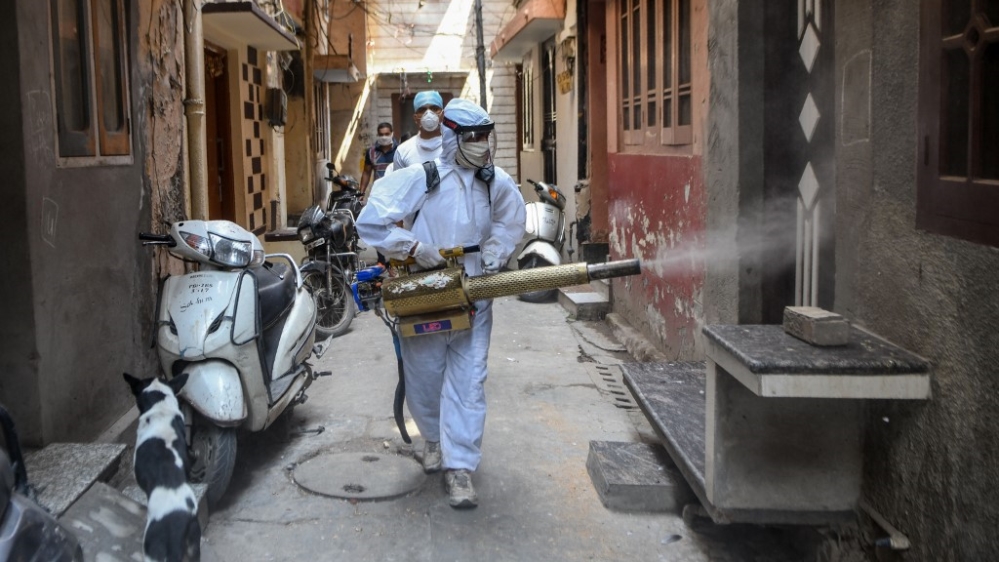
05:25 GMT – Pandemic compounds Mali’s ‘dire’ security crises
Antonio Guterres, the United Nations chief, said the coronavirus pandemic has compounded “the dire humanitarian and security situations” in Mali and Africa’s Sahel region.
In a report to the Security Council, obtained by The Associated Press news agency, Guterres said the deteriorating security situation “remains of grave concern with terrorist groups allied with al-Qaeda and Islamic State competing for control over areas of influence”.
|
|
He said attacks on civilians, Malian and international forces are continuing in northern and central Mali, and noted that clashes between al-Qaeda and Islamic State have also been reported.
The “impact of COVID-19 is exacerbating the humanitarian crises” in Mali, Guterres said, where 3.5 million people are suffering from “food insecurity” and 757,000 are “severely food insecure”.
04:42 GMT – Masks mandatory on UK buses, subways and trains
Passengers on England’s buses, subways and trains will have to wear face coverings starting from June 15 to help protect fellow passengers from the coronavirus.
Grant Shapps, the transport secretary, said the requirement was timed to coincide with the anticipated reopening of nonessential stores, including department stores and electronics retailers.
He said the face coverings are a “condition of travel” and failure to abide by the requirement could potentially lead to fines.
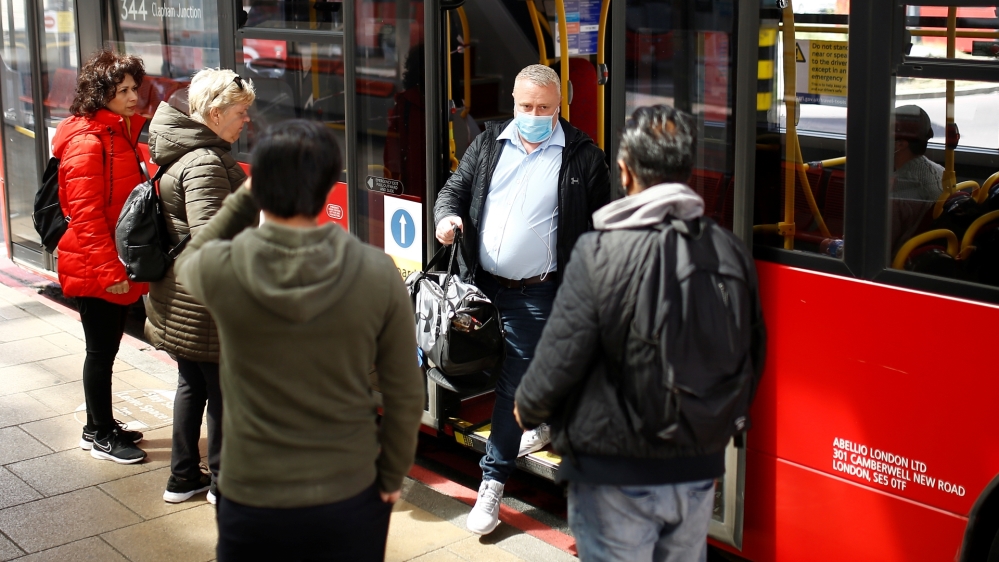
04:26 GMT – South Korea reports 39 cases
South Korea reported on Friday 39 new cases of the coronavirus over 24 hours, a continuation of an upward trend in new infections in the country.
The Korea Centers for Disease Control and Prevention said 34 of the additional cases were reported in the densely populated Seoul metropolitan area, where about half of South Korea’s 51 million people live.
The new figures took the country’s total to 11,668 cases, with 273 deaths.
South Korea has seen a rise in the number of new cases after easing much of its rigid social distancing rules in early May. But the caseload has not exploded, unlike when the country reported hundreds of new cases every day in late February and early March.
03:18 GMT – Japan’s Hitachi, Toshiba, Miraca to set up joint line for antigen test kits
Japanese industrial conglomerates Hitachi Ltd and Toshiba Corp, as well as Miraca Holdings subsidiary Fujirebio, said they will jointly set up a facility to produce antigen coronavirus testing kits.
The rare partnership would help double production of Fujirebio’s testing kits to 400,000 a week, the companies said. It would start operations by December in northern Hokkaido prefecture.
Antigen tests scan for proteins found on or inside a virus. They can detect the virus quickly but produce false negatives at a higher rate than the currently dominant polymerase chain reaction (PCR) tests.
It takes about 30 minutes to get a result with Fujirebio’s palm-sized antigen test kit, compared with four to six hours for a PCR test.
|
|
03:01 GMT – Five new imported cases in China
China reported five new confirmed coronavirus cases, all of them brought by Chinese citizens from outside the country.
No new deaths were reported on Friday, continuing a trend stretching back weeks.
China has reported 4,634 deaths among 83,027 cases since the virus was first detected in the central Chinese city of Wuhan late last year.
02:08 GMT – Study shows Spain far from having ‘herd immunity’ to virus
A second round of random testing in Spain shows only 5.2 percent of the population carry antibodies against the new coronavirus.
Researchers say that means Spain is far from having developed a “herd immunity” to COVID-19 and is still vulnerable to more outbreaks.
The survey of more than 64,000 people also shows that a third of those infected do not develop symptoms.
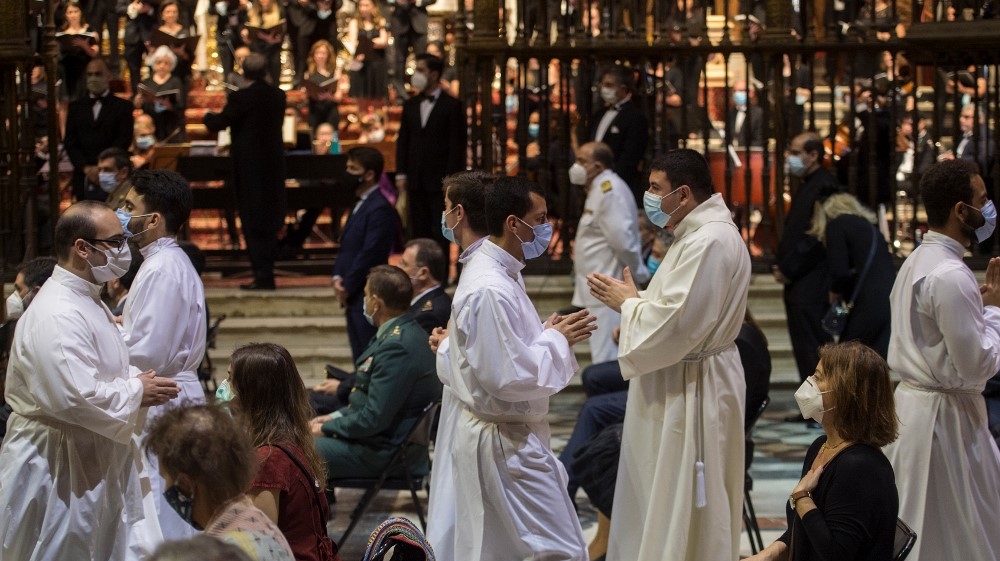
“It is a wake-up call for public health: it is not possible to control [an outbreak] by just considering those who are symptomatic,” National Epidemiological Center Director Marina Pollan said on Thursday.
“With this number of asymptomatic cases, we must follow the recommendations” for personal hygiene and social distancing, Pollan said.
01:58 GMT – New Zealand extends wage subsidy scheme
New Zealand said it was extending its wage subsidy scheme to help an additional 40,000 businesses keep staff employed as they recover from the impact of the coronavirus pandemic.
After feedback from businesses, the government decided to change the required revenue drop threshold for firms to apply for a wage subsidy to 40 percent from 50 percent, Finance Minister Grant Robertson said in a statement.
01:22 GMT – Brazil’s death toll surges to third highest in world
Brazil’s death toll from the new coronavirus has overtaken Italy’s to become the third-highest in the world, according to official figures.
The South American country of 210 million people reported a new record of 1,473 deaths in 24 hours, bringing its overall toll to 34,021, from 614,941 infections, the health ministry said.
Italy has confirmed 33,689 deaths from 234,013 infections.
|
|
01:07 GMT – Fiji says all COVID-19 patients recovered
Frank Bainimarama, the prime minister of Fiji, said all coronavirus patients in the Pacific island nation have now recovered.
“And even with our testing numbers climbing by the day, it’s now been 45 days since we recorded our last case. With no deaths, our recovery rate is 100%” he wrote in a tweet.
Fiji had recorded 18 infections, according to data from the Johns Hopkins University.
Fiji has just cleared the last of our active #COVID19 patients.
And even with our testing numbers climbing by the day, it's now been 45 days since we recorded our last case. With no deaths, our recovery rate is 100%.
Answered prayers, hard work, and affirmation of science!
— Frank Bainimarama (@FijiPM) June 4, 2020
00:42 GMT – Patients with high blood pressure ‘twice as likely to die’
Patients with high blood pressure admitted to hospital with coronavirus infections are twice as likely to die as those without the condition, according to a new study.
For inpatients with the virus who had stopped taking medication for high blood pressure, the risk of dying doubled again, researchers reported in the European Heart Journal.
“It is important that patients with high blood pressure realise that they are at increased risk of dying from COVID-19,” said senior author Fei Li, a cardiologist at Xijing Hospital in Xian, China.
The study also found that widely used drugs to control high blood pressure may help protect against severe COVID-19, allaying concerns that they could make the illness caused by the coronavirus worse.
|
|
00:15 GMT – Turkey to impose weekend curfew in 15 cities
Turkey will impose a two-day weekend curfew in 15 cities as part of efforts to prevent the spread of the novel coronavirus, the interior ministry said.
In a statement, the ministry said the lockdown will be in effect in Ankara, Istanbul, Izmir, Balikesir, Bursa, Eskisehir, Gaziantep, Kayseri, Kocaeli, Konya, Manisa, Sakarya, Samsun, Van and Zonguldak.
Markets, grocery stores and butcheries can operate during the lockdown, it added.
00:07 GMT – Argentina extends lockdown in Buenos Aires
Argentina extended until June 28 a mandatory lockdown in capital Buenos Aires and other areas with high cases of coronavirus, President Alberto Fernandez announced, after the country surpassed 20,000 confirmed cases earlier in the day.
Argentina’s lockdown, which was due to expire on June 7, has been in place since March 20, though officials relaxed restrictions in some areas of the country.
Hello and welcome to Al Jazeera’s continuing coverage of the coronavirus pandemic. I’m Zaheena Rasheed in Male, Maldives.
You can find all the updates from yesterday, June 4, here.